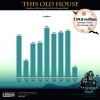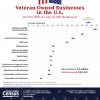Sep152015
Posted at 9:27 AM
In September 1968, Congress authorized President Lyndon B. Johnson to proclaim National Hispanic Heritage Week, observed during the week that included Sept. 15 and Sept. 16. Congress expanded the observance in 1989 to a monthlong celebration (Sept. 15 – Oct. 15) of the culture and traditions of those who trace their roots to Spain, Mexico and the Spanish-speaking nations of Central America, South America and the Caribbean.
Sept. 15 is the starting point for the celebration because it is the anniversary of independence of five Latin American countries: Costa Rica, El Salvador, Guatemala, Honduras and Nicaragua. In addition, Mexico and Chile celebrate their independence days on Sept. 16 and Sept. 18, respectively.
Following are some key statistics compiled by the U.S. Census Bureau in recognition of Hispanic Heritage Month.
55 million
The Hispanic population of the United States as of July 1, 2014, making people of Hispanic origin the nation’s largest ethnic or racial minority. Hispanics constituted 17 percent of the nation’s total population.
119 million
The projected Hispanic population of the United States in 2060. According to this projection, the Hispanic population will constitute 28.6 percent of the nation’s population by that date.
55%
The percentage of all the Hispanic population that lived in California, Florida and Texas as of July 1, 2014.
38.4 million
The number of U.S. residents 5 and older who spoke Spanish at home in 2013. This is a 120 percent increase since 1990 when it was 17.3 million. Those who hablan español en casa constituted 13.0 percent of U.S. residents 5 and older. More than half (58 percent) of these Spanish speakers spoke English “very well.”
For more key statistics, please go to the latest issue of the U.S. Census Bureau's Facts for Features.




